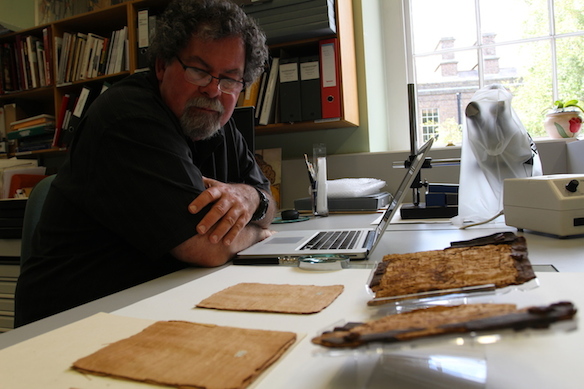As has become common around Christian holidays, another media outlet has issued what I think can rightly be called an attack piece. Newsweek rolled out a cover story for this week’s edition that attacks the Bible and the warrant for trusting that we even know what it says as well as its content:
http://www.newsweek.com/2015/01/02/thats-not-what-bible-says-294018.html
I’m all for free speech and critiquing all viewpoints including religious ones but this article makes egregious factual errors. Dr. Daniel B. Wallace, a world-renowned expert on early manuscripts of the New Testament (and shown in this picture), has responded to this article by pointing out numerous mistakes and some key omissions that make it quite misleading:
Predictable Christmas fare: Newsweek’s Tirade against the Bible
I’ve had the honor of getting acquainted with Dan the last couple of years as I’ve become involved in the Center for the Study of New Testament Manuscripts which he founded. This organization is doing incredibly important work to combat the kind of misconceptions propagated by this Newsweek article. Check out their web site to see how they’re digitizing early New Testament manuscripts and along the way even discovering new documents that are confirming our confidence in the transmission of these Biblical texts. I’ve found Dan to be fair-minded, incredibly knowledgeable, and sacrificially committed to the noble task of learning as much as we can from the earliest Greek texts of the New Testament books.
Here is a sampling of some of Wallace’s corrections but I recommend that you read his entire article:
Newsweek: “At best, we’ve all read a bad translation—a translation of translations of translations of hand-copied copies of copies of copies of copies, and on and on, hundreds of times.”
Wallace: “This is rhetorical flair run amok so badly that it gives hyperbole a bad name. A “translation of translations of translations” would mean, at a minimum, that we are dealing with a translation that is at least three languages removed from the original. But the first translation is at best a translation of a fourth generation copy in the original language. Now, I’m ignoring completely his last line—“and on and on, hundreds of times”—a line that is completely devoid of any resemblance to reality. Is it really true that we only have access to third generation translations from fourth generation Greek manuscripts? Hardly…. Almost 6000 of these [20,000+] manuscripts are in Greek alone. And we have more than one million quotations of the New Testament by church fathers. There is absolutely nothing in the Greco-Roman world that comes even remotely close to this wealth of data. The New Testament has more manuscripts that are within a century or two of the original than anything else from the Greco-Roman world too. If we have to be skeptical about what the original New Testament said, that skepticism, on average, should be multiplied one thousand times for other Greco-Roman literature.”
Newsweek: “About 400 years passed between the writing of the first Christian manuscripts and their compilation into the New Testament.”
Wallace: “The oldest complete New Testament that exists today is Codex Sinaiticus, written about AD 350… the reality [of the delay between completion of the New Testament and our oldest extant copy in complete form] is closer to 250–300 years (conservative), or 200–250 years (liberal). Yet even here the notion of “compilation into the New Testament” may be misleading: the original New Testament manuscripts were undoubtedly written on papyrus rolls, each of which could contain no more than one Gospel. It was not until the invention of the codex form of book, and its development into a large format, that the possibility of putting all the NT books between two covers could even exist.”
Newsweek: Constantine “changed the course of Christian history, ultimately influencing which books made it into the New Testament.”
Wallace: “This is an old canard that has no basis in reality. In fact, Eichenwald seems to know this because he does not bring it up again, but instead speaks about the Council of Nicea (initiated by Constantine) as dealing primarily with the deity of Christ. There is absolutely nothing to suggest in any of the historical literature that Constantine ever influenced what books belonged in the NT.”
There are many more examples such as these so please check out both Wallace’s response as well as the Newsweek article so you can understand the misconceptions that are being propagated in our culture and how to correct them. In summary, Newsweek’s article about the Bible is factually flawed, blatantly biased, and embarrassingly egregious in audaciously attacking a simplistic straw man. Other than that it’s a pretty good article.


















Facebook Comments